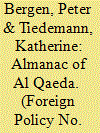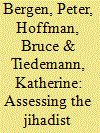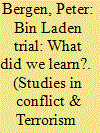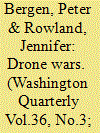|
|
|
Sort Order |
|
|
|
Items / Page
|
|
|
|
|
|
|
| Srl | Item |
| 1 |
ID:
095648


|
|
|
| 2 |
ID:
106612


|
|
|
|
|
| Publication |
2011.
|
| Summary/Abstract |
Al Qaeda and allied groups continue to pose a threat to the United States. Although it is less severe than the catastrophic proportions of a 9/11-like attack, the threat today is more complex and more diverse than at any time over the past nine years. Al Qaeda or its allies continue to have the capacity to kill dozens, or even hundreds, of Americans in a single attack. A key shift in the past couple of years is the increasingly prominent role in planning and operations that U.S. citizens and residents have played in the leadership of Al Qaeda and aligned groups, and the higher numbers of Americans attaching themselves to these groups. Another development is the increasing diversification of the types of U.S.-based jihadist militants, and the groups with which those militants have affiliated. Indeed, these jihadists do not fit any particular ethnic, economic, educational, or social profile. Al Qaeda's ideological influence on other jihadist groups is on the rise in South Asia and has continued to extend into countries like Yemen and Somalia; Al Qaeda's top leaders are still at large, and American overreactions to even unsuccessful terrorist attacks arguably have played, however inadvertently, into the hands of the jihadists. Working against Al Qaeda and allied groups are the ramped-up campaign of drone attacks in Pakistan, increasingly negative Pakistani attitudes and actions against the militants based on their territory, which are mirrored by increasingly hostile attitudes toward Al Qaeda and allied groups in the Muslim world in general, and the fact that erstwhile militant allies have now also turned against Al Qaeda. This article is based on interviews with a wide range of senior U.S. counterterrorism officials at both the federal and local levels, and embracing the policy, intelligence, and law enforcement communities, supplemented by the authors' own research.
|
|
|
|
|
|
|
|
|
|
|
|
|
|
|
|
| 3 |
ID:
020740


|
|
|
|
|
| Publication |
2001.
|
| Description |
429-434
|
|
|
|
|
|
|
|
|
|
|
|
|
|
|
|
| 4 |
ID:
066658


|
|
|
| 5 |
ID:
124841


|
|
|
|
|
| Publication |
2013.
|
| Summary/Abstract |
At the National Defense University (NDU) on May 23, 2013, President Barack Obama gave a major speech about terrorismarguing that the time has come to redefine the kind of conflict that the United States has been engaged in since the 9/11 attacks. Obama asserted that ''[w]e must define the nature and scope of this struggle, or else it will define us.''1 Thus, the President focused part of his speech on the Authorization for the Use of Military Force (AUMF), which Congress had passed days after 9/11 and which gave President George W. Bush the authority to go to war in Afghanistan against al-Qaeda and its Taliban allies. Few in Congress who voted for this authorization understood that they were voting for what has become the United States' longest war, one that has expanded in recent years to countries such as Pakistan and Yemen
|
|
|
|
|
|
|
|
|
|
|
|
|
|
|
|
| 6 |
ID:
095602


|
|
|
| 7 |
ID:
100162


|
|
|
| 8 |
ID:
068913


|
|
|
| 9 |
ID:
110849


|
|
|
|
|
| Publication |
2012.
|
| Summary/Abstract |
Ten years after 9/11, and after the death of Osama bin Laden, this article re-examines the early history of Al Qaeda-from its founding in August 1988 up until bin Laden's declaration of war against the United States in Afghanistan in 1996-by examining the group's aims, operations, alliances, finances, and administration during five distinct phases of the evolution of bin Laden's worldview. The authors argue that in assessing the formative years of bin Laden's organization, it is equally wrong to minimize the ambitions and organization of the early Al Qaeda as it is to telescope back from the Al Qaeda of the 9/11 attacks to argue that the group was organizing itself to wage a global Jihad from its inception. The authors outline how it was only a half decade later-after the group had decamped to Sudan, and after the U.S. had deployed troops in Saudi Arabia and Somalia-that al Qaeda shifted to conceiving its central mission as attacking American targets.
|
|
|
|
|
|
|
|
|
|
|
|
|
|
|
|
| 10 |
ID:
104860


|
|
|
| 11 |
ID:
118072


|
|
|
|
|
|
|
|